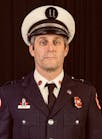The world in which we’re living—both inside of the fire station and outside—seems to get more complicated, more uncertain and more unstable as time goes on. With those challenges comes more stress, and that can take a toll on even the most seasoned veterans of the fire service and life.
Although it seems that stress, anxiety, coping and resiliency have come to the forefront over the past two decades, the Health Resource Network moved to create National Stress Awareness Month in April 1992 when life was seemingly simpler. There was no social media, no doomscrolling and limited 24/7 news coverage. Conceding that stress has been around for centuries, we are more aware of it today, and we need to focus on reducing it where we can.
In 2017, the Volunteer & Combination Officers Section of the International Association of Fire Chiefs published the Yellow Ribbon Report. It looked at the importance of stress management for firefighters. Many great efforts have been made since then to raise awareness and to bring resources to the fire service, the members of which not only deal with their stressors but then carry the burden to those who they are called out to help.
During travels last month, I witnessed stressors taking hold of people at airports, on planes, at doctor’s offices and at a small-town bank. With healthcare services struggling to maintain staff and to keep up with workloads, I saw that even those workers are short with clients, ready to move to the next thing with seemingly less interest in the current patient because of the demands on them.
A friend of mine who has spent nearly three decades in the volunteer fire service shared with me his dilemma to leave the department so he can focus on maximizing his final years working before retirement. His commitment to the firefighting family and to citizens, he said, outweighed his long-term commitment to his family and to himself. He explained how challenging it would be for him to hear rigs in his hometown respond without him being a part of the system. He went on to explain the lack of connection within his family and the angst that it created because of his commitment to the department. He realized that it’s time to restore those relationships before it’s too late.
Although firehouse humor is vital for shredding stress from runs you go on, there’s been a shift away from some of that as more awareness comes to light about humanity. It’s important to find those relief outlets to stay the course in the high-stress environment.
A chief shared with me how his companies came to him with a request to move from in-service station physical training to out-of-service company activities, whether it’s pickleball or basketball, which creates an opportunity for physical and mental well-being while allowing for laughter and stress-busting endorphin releases. The companies, which are out of service 30 minutes, tend to fare better for the remainder of the shift. This also is done by the medic units, to give them a break from the high-stress grind.
One thing that remains consistent and reliable in this world is your response to 9-1-1 calls, despite budget and staffing crunches and growing response volumes. It’s important that you keep tabs on each other and build those personal relationships that have been lost to phones and apps. The stressors inside and outside of the firehouse are building for so many and can become paralyzing, or worse.
As you go about your life and career in April, ensure that stress awareness is top of mind when you spend time with your family and in the jumpseat or at the firehouse kitchen table. Firefighters know how to determine what makes people tick, but let’s focus on ensuring that the clock is ticking forward and not stuck or ticking backward.

Peter Matthews | Editor-in-Chief/Conference Director
Peter Matthews is the conference director and editor-in-chief of Firehouse. He has worked at Firehouse since 1999, serving in various roles on both Firehouse Magazine and Firehouse.com staffs. He completed an internship with the Rochester, NY, Fire Department and served with fire departments in Rush, NY, and Laurel, MD, and was a lieutenant with the Glenwood Fire Company in Glenwood, NY. Matthews served as photographer for the St. Paul, MN, Fire Department.






